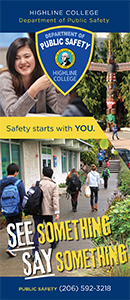Petitioner/Free-Speech Guidelines
Highline College is committed to creating an environment that fosters the exercise of protected speech and other expressive activity on college property while maintaining an atmosphere free of disruption to the mission of the college. It recognizes that the free expression of ideas and open inquiry are essential in fulfilling its academic mission by embracing rigorous open discourse, argumentation, speaking, listening, learning and the exploration of ideas.
Use of campus facilities may be subject to reasonable time, place, and manner restrictions that take into account, among other considerations, the governing Washington Administrative Code (WAC 1321-140-012), the direct and indirect costs to the institution; environmental, health and safety concerns; wear and tear on the facilities; and the impact of the event on the campus community, surrounding neighborhoods, and the general public. Unlawful communications, including threats of violence, obscenity, child pornography, and harassing communications, are prohibited.
Time, Place and Manner Restrictions
Highline College is committed to free exchange of ideas and the principles of academic freedom, in accordance with the First Amendment of the U.S. Constitution. However, the right to speak is not a right to speak at any time, at any place, and in any manner that a person wishes. Courts have long recognized that public colleges and universities have the right to set reasonable time, place, and manner restrictions on the use of their campus facilities. Time, place, and manner restrictions ensure the functioning of the campus by helping protect public health, safety, and welfare and prevent disruption of its educational, outreach, and other core functions. Simply put, this means that the College can delineate the “when, where and how” of free-speech activities, as long as it is applied in a content neutral way (in other words, it must apply to all speech, no matter how favored or disfavored) and it leaves ample opportunity for speech in alternative areas or forums.
Examples of such restrictions include:
-
- Regularly scheduled college activities take precedence over spur of the moment activities.
- Petitioner/free-speech activity may be conducted in free-speech zones on campus:
(a) The area west of the student services building (building 6) between
the building’s east entrance doors and the lecture hall (building 7).
(b) The south plaza of the library building (building 25 bounded by
building 23 and building 26 and excluding the landscaped areas). - College facilities may not be used in ways which obstruct or disrupt college operations, the freedom of movement, or any other lawful activities. No activity may obstruct entrances, exits, staircases, doorways, hallways, or the safe and efficient flow of people and vehicles. (WAC 132I-140-110)
- Other than the venue for petitioner/free-speech activities, Highline College does not provide additional equipment, supplies or facilities, and petitioners/speakers may not bring their own equipment to campus (i.e. chairs, tables, loud speakers, etc.).
- Petitioner/free-speech activity may not create unreasonable safety risks nor an imminent threat, health or safety hazard.
- Petitioner/free-speech activity, solicitation, or distribution of handbills, pamphlets and similar materials by anyone is not permitted inside college buildings.
- Petitioner/free-speech activities may not interfere with classes in session and/or other college activities, sound amplification is generally not allowed at times when classes are in session.
- Any opposing viewpoint expressive activity may be moved, but at a distance where they may still interact with the original expressive activity to ensure the safety of all participants.


